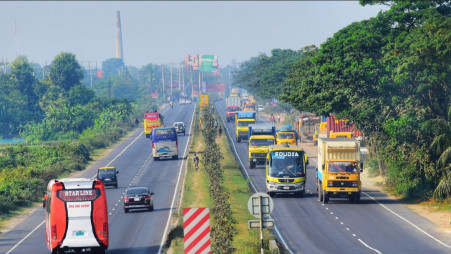More than 100 garment workers staged a protest on Sunday afternoon, blocking the Dhaka–Chattogram Highway at the busy AK Khan Intersection in Chattogram city for over an hour to demand two months of unpaid wages.
The demonstration severely disrupted traffic on one of the country’s busiest highways, causing widespread suffering for commuters and transport operators.
The protest began around 1:30pm, when workers from Needle Eye, a small ready-made garment (RMG) factory, took to the highway after failing to receive their wages for March and April.
The blockade created a traffic logjam stretching several kilometres along a key route that links Dhaka to the nation’s largest port city, underscoring the volatility in Bangladesh’s vital but vulnerable garment sector.
Confirming the incident, Additional Superintendent of Chattogram Industrial Police Jashim Uddin said Needle Eye is a small factory with around 100 workers. The owner is not affiliated with the Bangladesh Garment Manufacturers and Exporters Association (BGMEA) and has gone into hiding without paying wages for the last two months.
He added that police intervened quickly after receiving reports of the blockade. Authorities spoke to the workers and managed to convince them to lift the blockade by around 2:30pm.
The workers then went to the factory and locked the premises. They are currently holding the factory key. If the owner does not return to settle the dues, legal steps will be taken to auction the factory’s machinery to pay the workers, said the police officer.
By late afternoon, traffic on the highway had resumed, but the protest once again highlighted the precarious nature of labour rights and employer accountability in parts of Bangladesh’s garment industry, particularly among small, unaffiliated factories operating outside the regulatory oversight of major trade bodies.
The incident is not isolated. Labour unrest in the RMG sector has grown in recent years, driven by wage arrears, unsafe working conditions, and factory closures. While large factories under BGMEA’s umbrella generally comply with minimum wage and regulatory guidelines, smaller units like Needle Eye often operate informally and without proper financial safeguards for workers.


